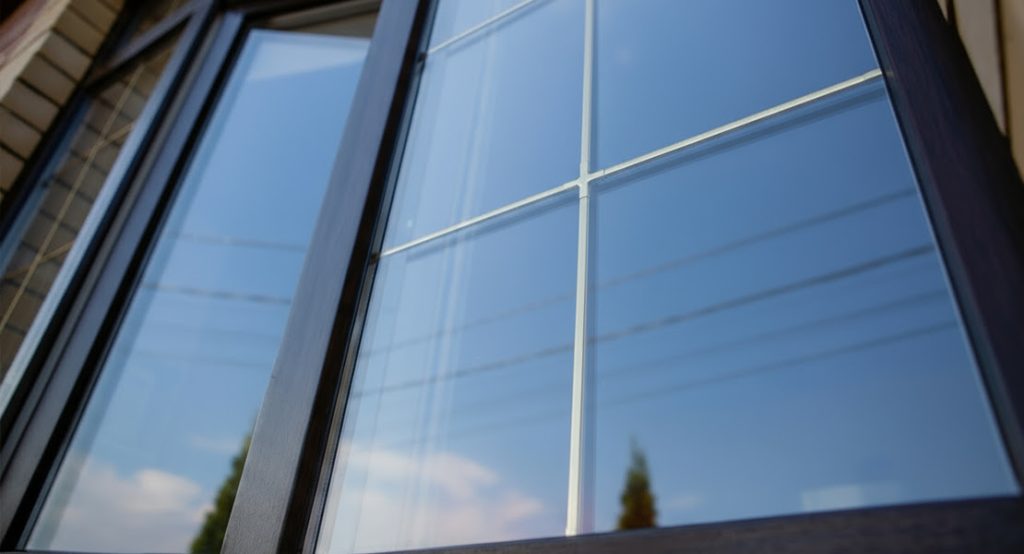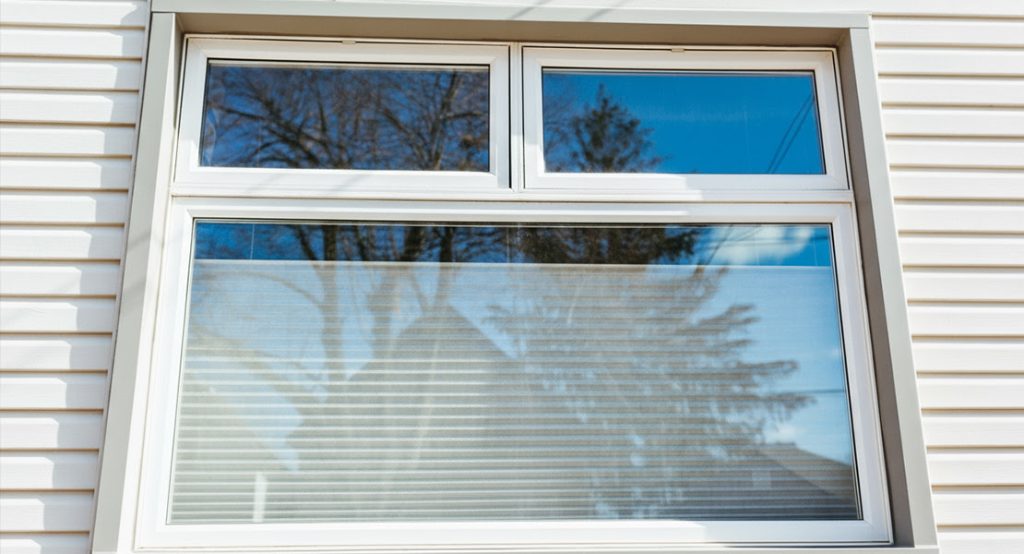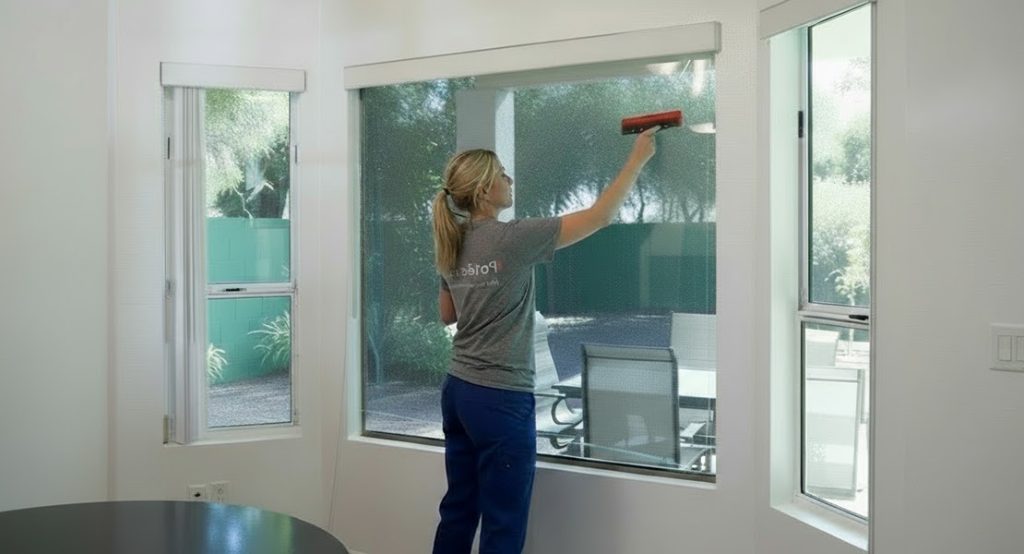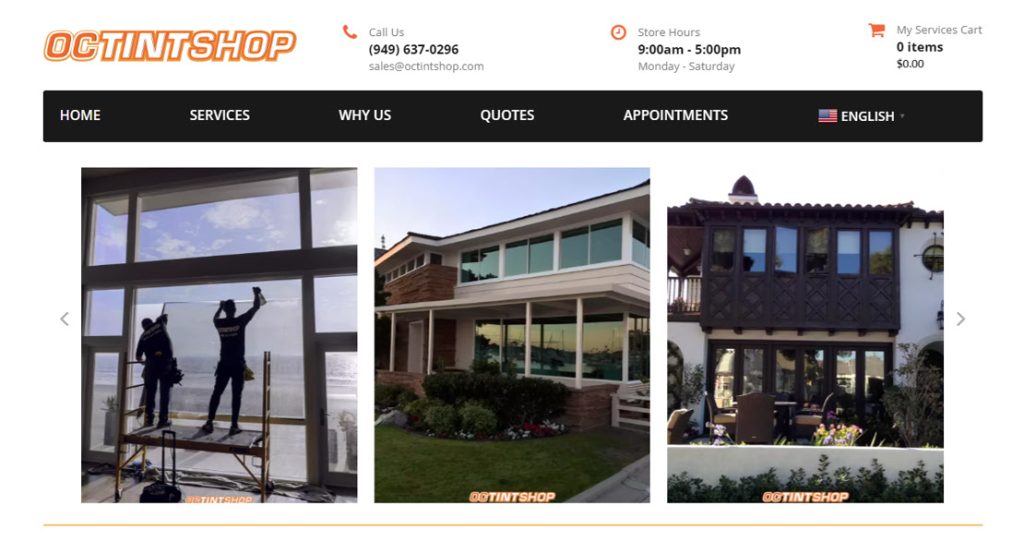Homeowners in Orange County who want to tint their windows don’t face the same strict requirements that apply to cars. Those automotive regulations actually don’t apply to houses at all. Home window tinting does have its own set of requirements, though, and they can be just as hard to understand.
California doesn’t have any statewide laws about how dark or reflective your home window tint can be. Some Orange County cities do have their own guidelines for reflective films, though. This mostly applies in areas where the glare could bother drivers or your neighbors. And if you have an HOA, they probably have their own set of restrictions hidden somewhere in their design requirements. These HOA requirements can be even stricter than what your city lets you do.
Window manufacturers have their own standards, too. Many of them won’t honor your warranty if you add aftermarket film to dual-pane glass. Some combinations of film and glass can cause thermal stress that makes your windows crack. Professional installers know which products qualify for utility rebates and federal tax credits that can cover a significant portion of the cost. But you’ll need to hold onto all your paperwork in order to get these benefits.
Each layer of regulation also affects the others.
Here’s what you need to know about window tinting requirements in Orange County!
California Window Tint Rules for Your Home
California doesn’t have a single law that limits how dark you can make your home’s window tint. I find this strange since the state has some of the strictest vehicle tint laws in the country. Car window tint laws are very strict and have almost no flexibility whatsoever. Home windows are unregulated by comparison.
The reasoning behind this gap in regulation actually relates to legitimate safety concerns. Police officers really need to be able to see inside vehicles when they pull somebody over, and that’s just common sense for everyone’s protection. Your home is private property, though. The state just takes a hands-off approach and lets homeowners make their own decisions about window treatments.
Home window tint also wasn’t actually common when most of our existing laws were being drafted decades ago. Homeowners just didn’t bother with residential window tint back then. Energy costs were low, and the technology was pretty primitive compared to what we have now. Once the tint became more popular and affordable, lawmakers already had plenty of other issues to worry about on their plates.

A few states actually do have regulations for residential window tint that apply statewide. Arizona won’t let you install very reflective windows because they can create serious glare problems for your neighbors. Texas has certain requirements for homes that are in historic districts because it wants to preserve the original character of these older neighborhoods. California took a very different strategy and just said each local government can figure out what works for their community.
Without any state-level standards to follow, we get a pretty confusing patchwork of local regulations. You have total freedom as far as the state is concerned. But each city and county can create its own set of requirements. A tint job that’s legal in one Orange County city could earn you a code violation letter if you drive just 10 minutes away!
All these different local standards mean that you should do your research before you install any window tint. Some cities couldn’t care less what you do with your windows. Others have pages and pages of requirements about maximum reflectivity levels and acceptable appearance standards.
City Laws About Your Window Film
California itself doesn’t actually have any state laws about residential window tint. But Orange County cities do have their own laws in place. Cities like Irvine and Newport Beach have already passed ordinances about window films on homes. Most of these local laws are focused on reflective or mirror-like films because they can create big glare problems for neighbors and for drivers on the road. Public safety is the biggest concern for most of these cities. Sunlight can hit a very reflective window and temporarily blind drivers or create uncomfortable conditions for neighbors. Many cities have decided to limit just how reflective your window tint can be. Some ordinances are also about privacy matters and keeping the neighborhood nice-looking.

Each city has its own way to deal with window tint violations. Newport Beach tends to send code enforcement officers out when neighbors file complaints about your windows. Irvine takes a different strategy and will make you remove the film and pay a fine for the violation. Penalties change quite a bit based on which city you’re in and who does the enforcement.
Many cities require you to pull a permit for any exterior work on your house. The window film falls into that category in these areas, even though the film goes on the inside surface of your glass. The problem is that it changes your home’s appearance from the street, and most cities treat it the same as exterior work anyway. Coastal cities usually have different priorities than inland communities do. A city near the beach is probably going to worry about reflective glare that could ruin the ocean views. Cities that are farther inland are probably more interested in heat reduction and energy efficiency benefits. Just pick up the phone and call your city’s building department to check their exact requirements before you schedule that installation!
HOA Rules for Your Window Tint
Your window tint might meet the city requirements and still cause you problems with your homeowners association. Almost every HOA in Orange County has a pretty strict set of guidelines for what houses are allowed to look like from the street. The whole point is to make sure that the neighborhood looks nice and uniform, and in theory, it also helps everyone’s property values stay high.
Remember those CC&Rs that came with your house paperwork? They stand for Covenants, Conditions and Restrictions, and I’d bet money that you never actually read the entire document from start to finish. Almost nobody does. These documents are the legal framework that lets your HOA control what you can and can’t do with your windows, along with a whole lot of other parts of your property.
Every homeowners association deals with window tinting differently, and the requirements can be different from one neighborhood to the next. A few associations are extremely strict about it and won’t let you add any tint at all to your windows. Most associations are somewhat more flexible, though, and they’ll approve your tint if it meets their darkness requirements and doesn’t have that reflective mirror finish. The approval process is where the frustration begins because nearly every association makes you submit a formal application to their architectural review board. Then the waiting game begins. A lucky few will hear back in 2 or 3 weeks. But plenty of homeowners find themselves waiting months for an answer.

California Civil Code Section 4725 sets up an interesting situation for homeowners who want to tint their windows. The law says that HOAs can’t ban solar panels or other energy-efficient improvements to your home. Many homeowners have been arguing that solar window films deserve this same protection under the statute. The courts haven’t provided a definitive ruling on this issue, and the law itself doesn’t explicitly mention window tinting. Even so, it might come in useful if your HOA decides to challenge you about energy-saving window tint.
Installing tint without asking for permission first is asking for problems. Your HOA will probably start with warning letters, then will move on to fines that can get expensive fast. In the worst-case scenario, they can put a lien on your property for unpaid fines. The best strategy is to look up your HOA guidelines first and make sure you have written approval in hand before any installer shows up at your door.
Keep Your Window Warranty with Professional Installation
Your HOA probably has some pretty strict guidelines on what you can do with your windows, and you need to know about them before you spend any money. Most homeowner associations throughout Orange County have guidelines for the exterior appearance of each house in the neighborhood. They’re usually trying to maintain a similar look across all of the properties, and it makes sense from a property value perspective. The best strategy is to pull out your CC&Rs and read through them from start to finish, or maybe just contact somebody on your HOA board to ask directly.
Your HOA could be fine with window tinting. But there’s a bigger problem that can damage your investment – your window warranty. The warranty on your windows will become void if the tint installation goes wrong or if you choose the wrong film for your particular windows. Big window manufacturers like Andersen and Pella put very particular language in their warranty paperwork about aftermarket films. Any damage from films that they haven’t approved won’t be covered, and they’re strict about enforcing this policy.
Every professional window film installer in California has to carry a contractor’s license through the Contractors State License Board. When your installer doesn’t have that license and something goes wrong with the installation, the law says you’re the one who is responsible for all of the damages and costs.

Window damage is a legitimate concern, and it happens regularly. Some window films just don’t work with dual-pane windows, and when you put the wrong type of film on them, you’re asking for problems. Heat gets trapped between the two panes of glass, and it builds up until the window eventually cracks. I’ve seen this happen with a few neighbors who bought the cheapest film they could find online because they wanted to save a few dollars.
Professional installers are around for real reasons, and once most homeowners learn about everything that can go wrong, they usually go with the pros. These businesses carry solid insurance policies that protect you if your windows get damaged while they’re working on them. They also know which films work with different types of glass and different window setups. The warranties alone are worth paying extra for. The film can start to bubble, peel or turn yellow after just a few months and a professional company will come back and fix everything for free. You won’t get any protection like that if you hire your cousin’s friend who tints windows on weekends for extra cash.
Rebates and Credits for Your Window Tint
Orange County actually has some excellent rebate programs for window tint, and lots of homeowners have no idea that they’re even out there. Southern California Edison and SoCal Gas will give you money back on the installations and can help offset what you pay at first. The main requirement is that your window film needs to be ENERGY STAR certified. Make sure to save all your receipts from your installation because you’ll need them for the rebate applications. Once your windows are done, just fill out the forms from each utility company and attach your documentation.
California has these energy efficiency standards called Title 24, and they apply to most home renovation projects that you might want to do. Window films help you meet these requirements, and it’s great because otherwise you’d be looking at thousands of dollars for new windows. The savings are pretty significant. Federal tax credits are another option to think about. The government looks at something called the Solar Heat Gain Coefficient rating when they determine which films qualify. Lower SHGC numbers mean that the film blocks more heat from entering your home. Most experienced installers know these ratings by heart and can tell you just what each film option will score.

Professional installation becomes even more valuable when you know about the paperwork requirements. Licensed contractors know just what documentation the utility providers need to see. They’ll give you every certificate and form that you need for your rebate applications and tax credit claims. You’ll miss out on all these financial benefits since DIY jobs almost never have the right certification documents.
Orange County also runs its own energy conservation programs on top of everything else. These local incentives usually change every year or two, and the best part is that they stack with state and federal benefits. The county website has an updated list of what programs are currently accepting applications. All these rebates and credits actually do add up. Most homeowners get back 30% to 40% of their total project cost.
Professional installation makes a lot more financial sense when that much money comes back your way.
Transform Your View with Professional Tinting
You have city regulations that you need to keep in mind, HOA requirements to follow, and warranty terms to stay on top of all at the same time. The great news is that when you actually sit down and go through your city’s local codes, look at your HOA documents and double-check your window warranty terms, the whole picture gets much simpler. You’ll know what types of tinting you can install and what you need to stay away from. It does take some time and effort to collect all this information up front.
Homeowners who actually do their homework before window tinting are usually happier with the final result. They never have to worry about angry HOA letters or discover their window warranty got canceled after the fact. These are the customers who sit back and appreciate their cooler homes and lower energy bills without any nagging worries in the back of their minds. They did it right from day one. The relief you feel knowing that you’ve checked every box and followed every regulation is worth just as much as the actual benefits of the tinting itself.

At OC Tint Shop, we’ve been in Orange County for years now, and we’ve helped hundreds of homeowners work through the requirements in their area. Our team knows all of the codes for each city from Huntington Beach to Mission Viejo, and we work with HOAs throughout the county every day. We make it our business to make sure that every installation we do meets their standards and keeps you compliant. The window films that we install are premium products that won’t void your manufacturer’s warranties, and many of them also qualify for local energy rebate programs, which is a great bonus. When you work with us, you can get the absolute most value possible from your investment. Our technicians handle everything from your first consultation through to the final installation and make sure your project stays within the requirements, as it still delivers the comfort and efficiency improvements you want for your home. I see homeowners run into compliance problems all of the time, and that’s why we’ve made it our priority to take care of the paperwork and approvals on your behalf. Ready to upgrade your home with window tinting that meets every requirement and delivers the results you need? Give us a call for your free consultation – we can discuss which options make the most sense for your home and your goals.

